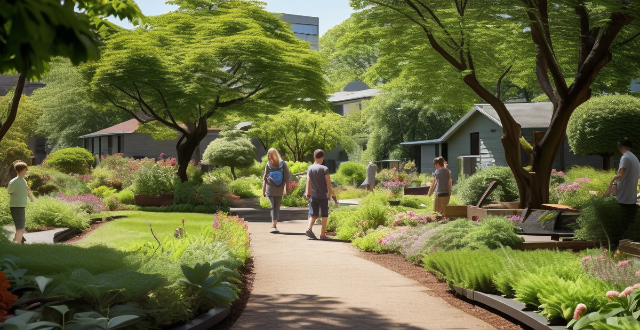Community gardens play a significant role in city greening efforts by providing environmental, social, economic, and urban planning benefits. These gardens improve air quality, enhance biodiversity, and promote soil health. They also foster community building, offer educational opportunities, and contribute to health promotion. Economically, community gardens provide food security and create job opportunities. Integrated into urban planning, they beautify cities and promote sustainable development. Overall, community gardens are vital for ecological health and improving residents' quality of life.

The Role of Community Gardens in City Greening Efforts
Community gardens play a significant role in city greening efforts by providing numerous benefits to both the environment and the community. These gardens not only contribute to the overall aesthetic appeal of urban areas but also serve as vital spaces for environmental sustainability, social interaction, and educational opportunities.
Environmental Benefits
Air Quality Improvement
- Reduction of Carbon Dioxide: Plants in community gardens absorb CO2, reducing the concentration of this greenhouse gas in the atmosphere.
- Increased Oxygen Production: Through photosynthesis, garden plants release oxygen, improving air quality.
Biodiversity Enhancement
- Habitat Creation: Community gardens provide habitats for various species of insects, birds, and small mammals.
- Plant Diversity: A wide range of plant species are cultivated in these gardens, contributing to overall biodiversity.
Soil Health Improvement
- Soil Remediation: Garden activities can help improve soil quality and structure.
- Composting: Organic waste from gardens can be composted, enriching the soil naturally.
Social Benefits
Community Building
- Neighborhood Cohesion: Gardens bring people together, fostering a sense of community and belonging.
- Cultural Exchange: Community members share gardening practices and cultural traditions related to plants and food.
Educational Opportunities
- Gardening Workshops: Skill development through workshops on topics like composting, seed starting, and pest management.
- Nutrition Education: Learning about healthy eating habits through growing fruits and vegetables.
Health Promotion
- Physical Activity: Gardening involves physical work, promoting an active lifestyle.
- Mental Well-being: Interacting with nature and engaging in communal activities can reduce stress and improve mental health.
Economic Benefits
Food Security
- Access to Fresh Produce: Community gardens offer residents access to fresh fruits and vegetables, especially in areas with limited grocery options.
- Reduced Food Costs: Gardeners can save money by growing their own food.
Job Creation
- Garden Maintenance: Some gardens may employ local residents for maintenance tasks.
- Entrepreneurial Opportunities: Gardeners can sell excess produce, creating small businesses.
Urban Planning Integration
Aesthetic Enhancement
- Beautification: Well-maintained gardens add beauty to urban landscapes.
- Urban Design: Gardens can be integrated into city designs, enhancing the overall planning and aesthetics of urban spaces.
Sustainable Development
- Resource Management: Community gardens promote sustainable practices like water conservation and responsible waste disposal.
- Energy Conservation: Green spaces like gardens can help reduce urban heat island effects, potentially reducing energy needs for cooling.
In conclusion, community gardens serve as crucial elements in city greening efforts by offering environmental, social, economic, and urban planning benefits. They not only contribute to the ecological health of cities but also enhance the quality of life for residents through social interaction, education, and improved access to fresh produce.